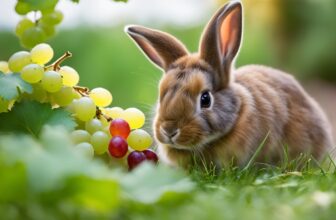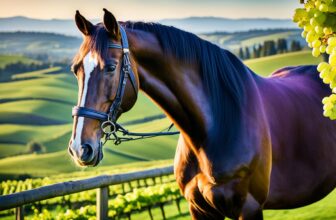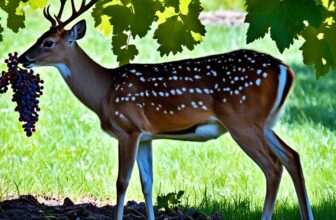Can Parrots Eat Grapes? Safe Snacks for Your Bird
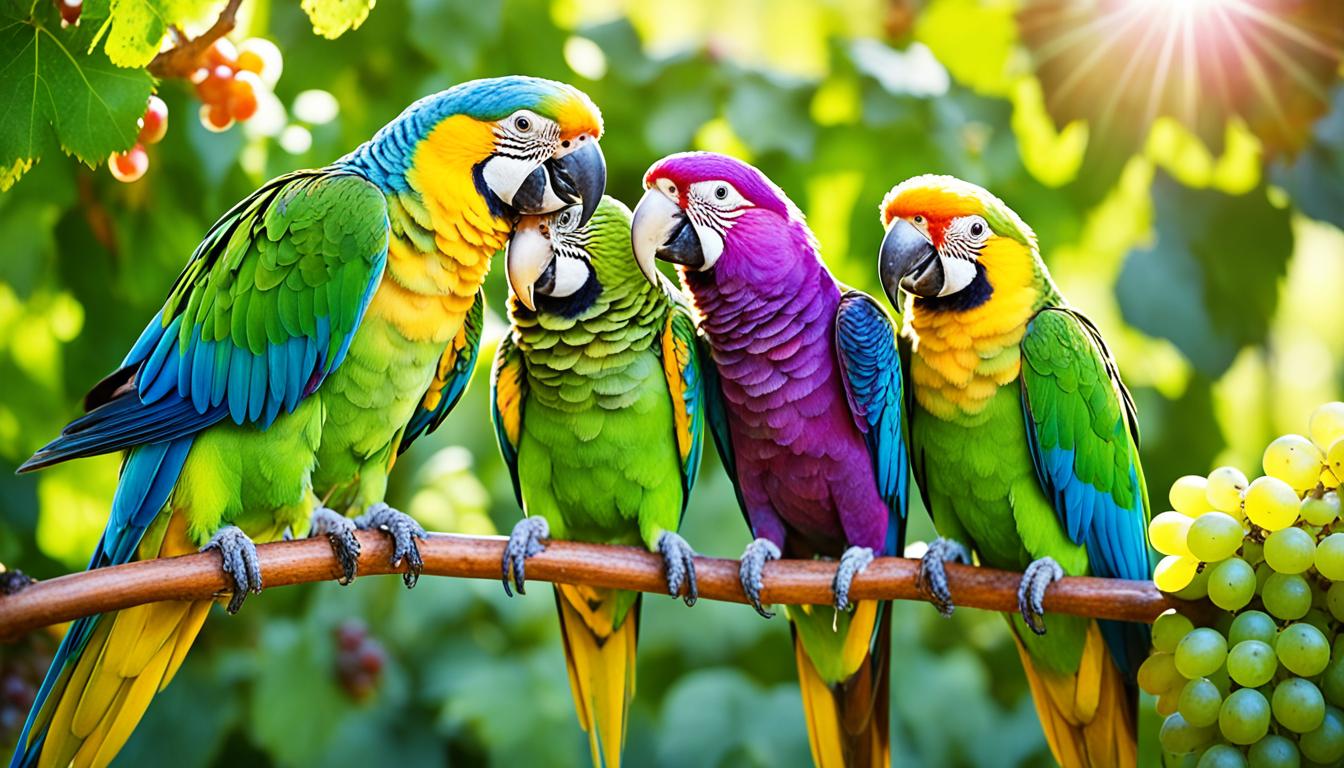
As pet owners, we all want to provide our feathered friends with the best possible nutrition. When it comes to parrots, the question of whether they can safely consume grapes often arises. After all, grapes are a beloved fruit for many of us, but their safety for our avian companions may not be as straightforward. In this article, we’ll explore the intriguing world of parrots and grapes, uncovering the answers to this captivating query.
Key Takeaways:
- Parrots can safely eat grapes in moderation, as they provide essential nutrients.
- Grape seeds and peels should be removed to prevent potential choking or digestive issues.
- Portion control is crucial, as excessive grape consumption can lead to weight gain and nutrient deficiencies.
- Thoroughly washing grapes to remove pesticides is recommended before feeding them to parrots.
- Grapes can be a healthy and enjoyable treat for parrots when incorporated into a balanced diet.
Are Grapes Safe for Parrots?
When it comes to feeding grapes to parrots, the good news is that grapes are generally safe for these feathered friends. Grapes do not contain any inherent toxins that could harm parrots. However, it’s important to understand that moderation is key when it comes to incorporating grapes into a parrot’s diet.
Grapes Contain No Inherent Toxins
Unlike some fruits and vegetables that can be toxic to parrots, such as avocado and onions, grapes pose no such risk. Parrots can safely consume both the flesh and the seeds of grapes without any concern for poisoning or adverse effects. This makes grapes a suitable parrot-friendly treat.
Moderation is Key
While grapes are not inherently toxic to parrots, overfeeding them can lead to health issues. Grapes are high in natural sugars, and consuming too many can contribute to weight gain and nutritional deficiencies if they displace other essential foods in the parrot’s diet. It’s crucial to feed grapes in moderation as an occasional healthy snack for your parrot, not as a dietary staple.
To ensure the safety and well-being of your feathered friend, it’s recommended to limit grapes to no more than one or two per week as a special treat. Additionally, be sure to thoroughly wash the grapes to remove any potential pesticide residue before feeding them to your parrot.
“Grapes are a nutritious fruit for parrots, but they should be fed in moderation to maintain a balanced and healthy diet.”
Benefits of Grapes for Parrots
Parrots are curious and intelligent birds that require a varied and nutritious diet to thrive. Interestingly, grapes can be a beneficial addition to a parrot’s diet, providing a range of essential nutrients and health benefits. As part of a balanced parrot diet, grapes can be a delightful and parrot-friendly treat.
Antioxidants
Grapes are packed with powerful antioxidants, such as resveratrol and vitamin C, which can help protect a parrot’s avian pet care by neutralizing harmful free radicals. These antioxidants support heart health and overall immunity, reducing the risk of long-term complications.
Fiber
Grapes contain both soluble and insoluble fibers that can promote healthy digestion in parrots. The fiber content helps regulate bowel movements, preventing constipation and supporting the overall parrot nutrition. This can be particularly beneficial for parrots prone to gastrointestinal issues.
Essential Vitamins and Minerals
Grapes are a rich source of essential vitamins and minerals, including vitamin K, vitamin B6, copper, and manganese. These nutrients play a crucial role in a parrot’s growth, development, and maintaining strong bones and feathers. Incorporating grapes as part of a balanced healthy snacks for parrots can contribute to their overall health and well-being.
“Grapes are a fantastic, nutrient-dense treat that can be a wonderful addition to a parrot’s diet when fed in moderation.”
By providing a variety of parrot-friendly treats, including grapes, pet owners can ensure their feathered companions receive the essential nutrients they need to thrive.
can parrots eat grapes
Absolutely, parrots can enjoy grapes as a safe and nutritious snack when given in moderation. Grapes are a popular treat among parrot owners, as these vibrant fruits provide a variety of essential vitamins, minerals, and antioxidants that can benefit the overall health and well-being of your feathered friend.
While there is a range of opinions on feeding grapes to parrots, the general consensus among avian experts and pet owners is that grapes can be a great addition to a parrot’s balanced diet. Many parrot owners report their birds thoroughly enjoying seedless grapes, with some providing their feathered companions with 1-5 grapes per day as an occasional treat.
Grapes are not only packed with essential nutrients but also offer hydration due to their high moisture content, making them an excellent choice for parrot-friendly snacks. However, it’s important to note that grapes are relatively high in natural sugars, so they should be fed in moderation as part of a well-rounded diet.
To ensure the safety and well-being of your parrot, it’s always recommended to consult with an avian veterinarian before introducing any new foods, including grapes, into your bird’s diet. With proper guidance and a balanced approach, grapes can be a delightful and nutritious addition to your parrot’s mealtime routine.
| Nutrient | Amount in Grapes | Benefit for Parrots |
|---|---|---|
| Vitamin C | 3.6 mg per 100g | Supports immune function and healthy feathers |
| Vitamin K | 0.6 mcg per 100g | Aids in blood clotting and bone health |
| Antioxidants | High in resveratrol and flavonoids | Helps protect cells from oxidative damage |
| Fiber | 0.9g per 100g | Promotes healthy digestion and gut function |
Remember, when feeding grapes to your parrot, it’s essential to choose organic, pesticide-free options and remove any seeds or stems before offering them. Proper portion control and monitoring your bird’s response to this tasty treat are also crucial for their safety and well-being.
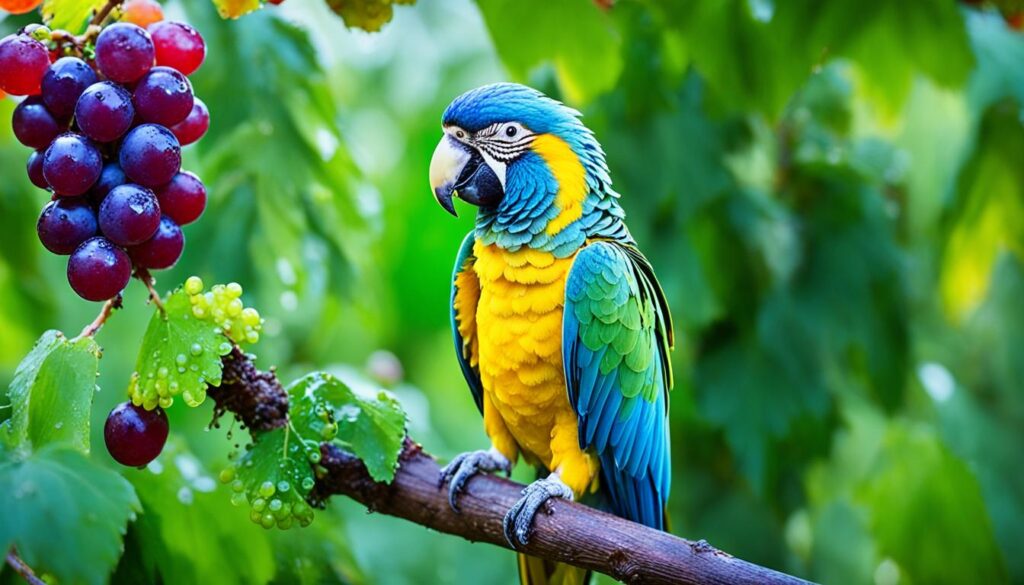
“Grapes are one of my parrot’s favorite snacks! I make sure to give him a couple of seedless grapes as a special treat a few times a week. He goes absolutely wild for them!”
– Avid Parrot Owner
Potential Risks of Overfeeding Grapes
While grapes can be a healthy and nutritious snack for parrots, feeding them too many grapes can lead to potential health risks. Overfeeding grapes can result in weight gain and nutritional deficiencies, which can be detrimental to your feathered friend’s well-being.
Weight Gain
Grapes are high in natural sugars, which can contribute to weight gain in parrots if consumed in excess. Parrots are prone to obesity, and a diet heavy in sugary fruits like grapes can make them more susceptible to health issues such as heart disease, liver problems, and metabolic disorders. It’s essential to monitor your parrot’s portion sizes and ensure that grapes make up only a small percentage of their overall diet.
Nutritional Deficiencies
If parrots become overly fond of grapes and neglect other essential foods in their diet, they may develop nutritional deficiencies. Parrots require a balanced diet that includes a variety of fresh fruits, vegetables, proteins, and other nutrients to maintain optimal health. Overindulging in grapes can lead to a lack of crucial vitamins, minerals, and other essential nutrients, potentially causing serious health problems such as poor feather quality, weakened immune systems, and organ dysfunction.
To keep your parrot healthy and happy, it’s crucial to introduce grapes and other fruits in moderation as part of a well-rounded, nutritious diet. By understanding the potential risks of overfeeding grapes, you can ensure your feathered companion enjoys the benefits of this tasty treat while avoiding any adverse consequences.
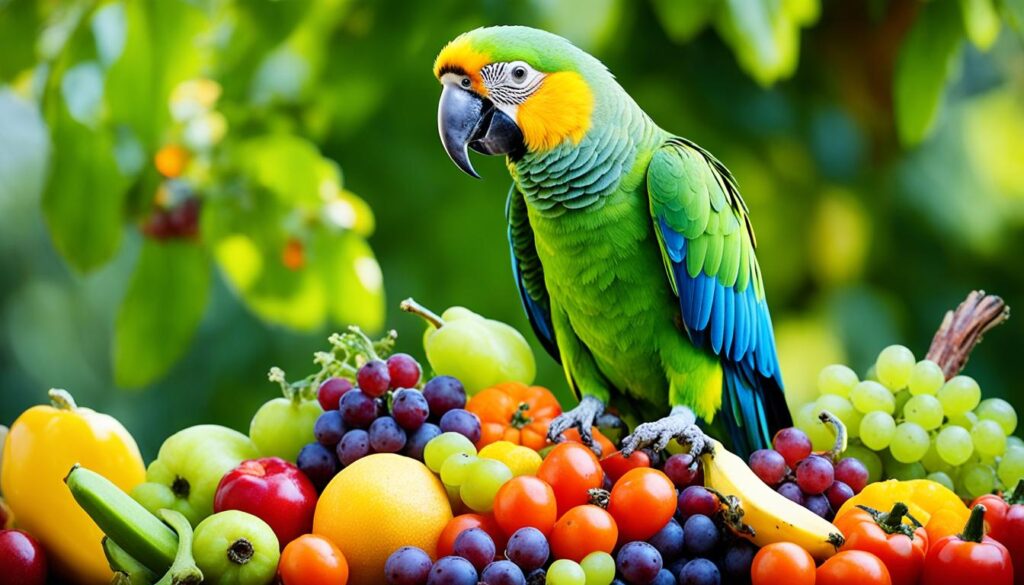
Preparing Grapes for Your Parrot
When it comes to feeding grapes to your feathered friend, proper preparation is key. Parrots are delicate creatures, and their diet must be carefully curated to ensure their overall health and well-being. As you incorporate grapes into your parrot’s diet, there are a few essential steps to follow.
Removing Peels and Seeds
The first step in preparing grapes for your parrot is to remove the grape seeds. These small, hard objects can pose a serious choking hazard, especially for smaller birds. Additionally, the grape peels should be removed, as they may contain high levels of pesticide residues that can be harmful to your parrot.
Washing and Portion Control
Before serving grapes to your parrot, it’s crucial to thoroughly wash them under running water. This step helps to remove any chemical contamination or residue that may be present on the fruit. When it comes to portion control, it’s important to remember that moderation is key. A small parrot can be given half a grape, while a larger parrot can have a whole grape. Grapes should not be fed to your parrot more than three times a week, as they are high in fructose and can lead to weight gain and other health issues if consumed in excess.
By following these simple steps, you can ensure that your parrot can safely enjoy the benefits of grapes as part of a balanced and nutritious diet. Remember, providing your feathered companion with the proper care and feeding is essential for their overall well-being and longevity.
Grapes for Baby Parrots
As parents to our feathered friends, we naturally want to provide the best possible nutrition for their growth and development. When it comes to baby parrots, the question of whether grapes are a safe and suitable snack often arises. While grapes can be a beneficial addition to a parrot diet, extra precautions should be taken when feeding them to our youngest avian companions.
Grapes can also be a great parrot-friendly treat for baby parrots, offering a range of health benefits. However, their parrot nutrition needs differ from adults, and their delicate digestive systems require special consideration.
Preparing Grapes for Baby Parrots
Before serving grapes to your baby parrot, it’s crucial to take a few essential steps:
- Cut the grapes into smaller, bite-sized pieces to prevent choking hazards.
- Carefully remove any seeds or pits, as these can pose a serious risk to your little one.
- Wash the grapes thoroughly to remove any traces of pesticides or other avian pet care concerns.
- Offer only a small portion, as grapes are high in sugar and can lead to weight gain and nutritional deficiencies if overindulged.
Moderation is Key
While grapes can be a tasty and healthy snack for parrots, it’s essential to feed them in moderation, especially for baby parrots. Their developing digestive systems may not be able to handle large quantities of grapes, leading to potential issues such as diarrhea, vomiting, or even more severe complications.
As a general guideline, it’s recommended to limit grape servings to no more than half a grape per feeding for small parrots, and a whole grape for larger birds. Additionally, grapes should not be fed more than three times a week to prevent grape risks for parrots.
Monitoring for Reactions
Every parrot is unique, and their individual reactions to grapes may vary. It’s important to closely monitor your baby parrot after introducing grapes to their diet. If you notice any signs of distress, such as vomiting, diarrhea, or lethargy, discontinue feeding grapes and consult your avian veterinarian immediately.
By taking the necessary precautions and exercising caution, you can safely incorporate grapes into your baby parrot’s healthy snacks for parrots and support their growth and development.
Conclusion
In conclusion, parrots can safely eat grapes as an occasional treat, but it’s crucial to feed them in moderation and with proper preparation. Grapes are a nutritious snack that can provide parrots with a variety of essential vitamins, minerals, and antioxidants. However, overfeeding grapes can lead to potential health risks, such as weight gain and nutritional deficiencies.
By following the guidelines outlined in this article, you can safely incorporate grapes into your parrot’s diet and provide them with a delicious and healthy snack. Remember to limit grapes to 1-4 per week based on your parrot’s size, opt for organic grapes to avoid pesticides, and always wash and prepare the grapes properly to prevent choking hazards. With the right approach, grapes can be a wonderful addition to your parrot’s balanced diet, offering a range of beneficial nutrients and antioxidants.
Ultimately, a varied diet that includes a mix of fresh fruits, vegetables, pellets, and occasional treats is key to maintaining your parrot’s overall health and well-being. By understanding the benefits and risks of feeding grapes, you can make informed decisions to ensure your feathered friend enjoys a safe, nutritious, and enjoyable diet.



